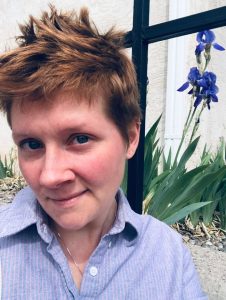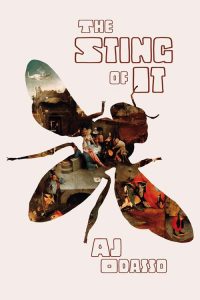We’re very happy to announce that A.J. Odasso’s (Poetry ’16) third collection, The Sting of It, is forthcoming in 2019! It will be published by Tolsun Books, and is an expanded version of A.J.’s BU M.F.A. poetry thesis. The manuscript was shortlisted for the Sexton Prize in July of 2017 under the title Things Being What They Are.
We took a minute to ask A.J. some questions about working on their third book.
What challenges did you face while writing The Sting of It?
I feel like the trickiest part of bringing this book to fruition wasn’t so much the revision and expansion aspect as negotiating who would be publishing it! In the wake of its shortlisting for the 2017 Sexton Prize at Eyewear Books, Eyewear expressed interest in publishing it in Fall 2019 alongside the winner and runners-up. However, some complications and delays in communication from Eyewear – which were experienced by nearly all of us meant to be published by them in 2019 – resulted in a number of us breaking ties and seeking publication elsewhere. Between July and October this year, I sent The Sting of It to a handful of other presses that generously offered to priority-read and consider newly-homeless, former Eyewear collections. Tolsun Books felt like the best fit for my style and aesthetic out of all of them, so I was thrilled when, in late September, they offered me a contract.
Tell us about the cover.
The stellar cover design is by my editor at Tolsun, David Pischke. David and his team have been nothing but a pleasure to work with, and it’s early days yet. I got little say in the cover designs of my first two collections with Flipped Eye, but I got to request the inclusion of Hieronymus Bosch’s The Temptation of Saint Anthony triptych as part of the design for this collection’s cover – and got it. I couldn’t be more thrilled.
Who have your most significant stylistic influences been?
The earliest poems that got me to attempt writing my own were Shakespeare’s sonnets at the back of a crumbling 1920s edition of the Complete Works that belonged to my maternal grandfather. I was about 14 when I trained myself to write sonnets using Shakespeare as a template, and swiftly branched out into experimenting with other forms (Elizabeth Bishop’s “Sestina,” as well as Bishop’s complete known body of work, has remained a favorite and profound influence to this day). Through high school and into college, I picked up Geoffrey Chaucer, the Gawain-Poet, and other 14th-century English writers. While completing my M.A. in Interdisciplinary Medieval Studies at the University of York, I strengthened my fluency in reading Middle English and discovered other medieval poets’ work that hadn’t been as widely available to me before. Since then, I’ve shifted my recreational poetry reading back toward the contemporary. Louise Glück, Ursula Le Guin, Patience Agbabi, Naomi Shihab Nye, and a number of British poets with whom I did readings on the York and London poetry circuits have been the most lasting modern influences on my style.
Congratulations, A.J.! We can’t wait to read The Sting of It.
A.J. Odasso (Poetry ’16) is the author of two poetry collections from UK-based Flipped Eye Publishing: Lost Books (2010), which was a finalist for the 2010 London New Poetry Award and for the 2011 People’s Book Prize; and The Dishonesty of Dreams (2014), which had the honor of launching at the Grolier Poetry Book Store and Porter Square Books. A.J.’s third collection, an expanded version of their BU MFA thesis, was shortlisted for the 2017 Sexton Prize under the title Things Being What They Are and will be published in Summer 2019 under a new title, The Sting of It, by Tolsun Books. A.J. continues to serve as Senior Poetry Editor at Strange Horizons magazine, where they have been part of the editorial staff since 2012. A.J.’s recent prose publications include a short story, “We Come Back Different” (in the Winter 2018 & Spring 2018 issues of Pulp Literature) and a personal essay, “Being the Dictionary” (in Knowing Why: Adult-Diagnosed Autistic People on Life and Autism, an anthology from the Autistic Self-Advocacy Network launched this October).


